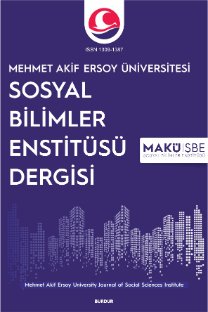ENDÜSTRİ 4.0 SÜRECİNDE FİNANSAL RAPORLAMANIN EVRİMİ: "ENTEGRE RAPORLAMA" MI?
Entegre Raporlama, Sürdürülebilirlik Raporlaması, Geleneksel Raporlama, Küresel Rapor Düzenleyiciler
THE EVOLUTION OF FINANCIAL REPORTING IN INDUSTRY 4.0 PROCESS: "INTEGRATED REPORTING"?
Integrated Reporting, Sustainability Reporting, Traditional Reporting, Global Report Editors,
___
Basalla, G. (1996). Teknolojinin evrimi (C. Soydemir (çev.)). Tübitak Yayınları.CDSB. (2021). Climate disclosure standards board. https://www.cdsb.net/
Çelebier, M., & Çankaya, F. (2019). Entegre raporlama ile ilgili yapılan çalışmalar: Literatür taraması. Uluslararası Ekonomi ve Yenilik Dergisi, 5(2), 179–196.https://doi.org/10.20979/ueyd.560581
de Villiers, C., Venter, E. R., ve Hsiao, P. C. K. (2017). Integrated reporting: background, measurement issues, approaches and an agenda for future research. Accounting and Finance, 57(4), 937–959. https://doi.org/10.1111/acfi.12246
Deutschlandt. (2014). Hannover fuarı’nda endüstri 4.0. Deutschlandt. https://www.deutschland.de/tr/topic/ekonomi/kuresellesme-uluslararasi-ticaret/hannover-fuarinda-endustri-40
Duran, A. E. (2021, 7-20 Mart). Şirketlerde entegre raporlamaya ilgi artıyor. Ekonomist Dergisi. https://www.ekonomist.com.tr/arastirmalar/sirketlerde-entegre-raporlamaya-ilgi-artiyor.html
Eccles, R. G., ve Saltzman, D. (2011, Mart). Achieving sustainability through integrated reporting. Stanford Social Innovation Review 9, 56–61.
Ege, B. (2014, Mayıs). 4. Endüstri devrimi: Kapıda mı? Bilim ve Teknik, 26–29.
Enget, K., Saucedo, G. D., ve Wright, N. S. (2017). Mystery, Inc.: A big data case. Journal of Accounting Education, 38, 9–22. https://doi.org/10.1016/j.jaccedu.2016.12.003
Ergün, İ. E. (2019). Bilgi teknolojileri ve muhasebe yazılımları. A. Sevim (Ed.), Muhasebe yazılımları içinde. Anadolu Üniversitesi.
Göde, M. Ö., ve Ekergil, V. (2017). Küresel raporlama girişimi standartlarına göre seçilen otellerin sürdürülebilirlik raporlarının analizi ve değerlendirilmesi. Business and Economics Research Journal, 8(4), 859–871. https://doi.org/10.20409/berj.2017.71
GRI. (2021). Global reporting initiative. https://www.globalreporting.org/
Günay, D. (2002). Sanayi ve sanayi tarihi. Mimar ve Mühendis Dergisi, 31, 8–14.
Haberal, Z. (2021). Büyük ve orta ölçekli işletmeler için finansal raporlama standardı, küçük ve mikro işletmeler için finansal raporlama standardı taslak metni ile vergi usul kanununun değerleme hükümlerinin karşılaştırılması. Muhasebe ve Denetime Bakış, 2021(62), 329–344.
HBR. (2020). Webinar: Bulut ve yapay zeka (Cloud & AI). Harvard Business Review. https://webinar.hbrturkiye.com/
IIRC. (2013). Uluslararası entegre raporlama çerçevesi (2013). https://integratedreporting.org/wp-content/uploads/2015/03/13-12-08-THE-INTERNATIONAL-IR-FRAMEWORK-Turkish.pdf
IIRC. (2021a). International integrated reporting council. https://integratedreporting.org/
IIRC. (2021b). Uluslararası entegre raporlama çerçevesi (Ocak 2021). https://integratedreporting.org/wp-content/uploads/2021/01/InternationalIntegratedReportingFramework.pdf
Karaburun, G., ve Demirci, Ş. D. (2020). Muhasebe kültürü ve entegre raporlama farkındalığı ilişkisi. Journal of Economy Culture and Society, 62, 345–364. https://doi.org/10.26650/jecs2020-0057
Keywell, B. (2017). The fourth industrial revolution is about empowering people, not the rise of the machines. https://www.weforum.org/
KGK. (2018). Kamu Gözetimi Kurumu. Finansal raporlamaya ilişkin kavramsal çerçeve. https://kgk.gov.tr/Portalv2Uploads/files/Duyurular/v2/TMS Sunumlar/Finansal Raporlamaya İlişkin Kavramsal Çerçeve.pdf
KGK. (2021). Kamu Gözetimi Kurumu. Türkiye muhasebe standartları sunum ve taslakları. https://kgk.gov.tr/DynamicContentDetail/4105/TurkiyeMuhasebeStandartları
Leigh, G. R. (2018). Integrated reporting: The South African experience. Cap Journal. https://www.cpajournal.com/2018/08/09/icymi-integrated-reporting-the-south-african-experience/
Lewis, M. W., ve Boyer, K. K. (2002). Factors impacting AMT implementation: An integrative and controlled study. Journal of Engineering and Technology Management, 19(2), 111–130.
I Sıra Nolu MSUGT. Muhesebe sistemi uygulama genel tebliği, R.G. 21447 (M) Tarih 26/12/1992
Önce, S., ve Çavuş, G. (2020). Sürdürülebilirlik raporlaması ve finansal raporlama kalitesi ilişkisi: BİST’e kote imalat işletmelerinde araştırma. Muhasebe Enstitüsü Dergisi, 62, 1–10. https://doi.org/10.26650/med.2020674583
Önce, S., Onay, A., ve Yeşilçelebi, G. (2015). Kurumsal sürdürülebelirlik raporlaması ve Türkiye’deki durum. Journal of Economics Finance and Accounting, 2(2), 230–252.
Öztuna, B. (2017). Endüstri 4.0. Gece Kitaplığı.
Perrin, F. (2005). Building a European portrait of corporate social responsibility reporting. European Management Journal, 23(6), 605–624.
Press. (2021). Joint press release from GIR and SASB [Basın Açıklaması]. https://www.sasb.org/wp-content/uploads/2021/04/Joint-press-release-GRI-SASB-April-2021-Final.pdf
Reporting, (2020). Statement of intent to work together towards comprehensive corporate reporting. https://29kjwb3armds2g3gi4lq2sx1-wpengine.netdna-ssl.com/wp-content/uploads/Statement-of-Intent-to-Work-Together-Towards-Comprehensive-Corporate-Reporting.pdf
Rogers, J., Freiberg, D., ve Serafeim, G. (2019). How sustainability issues become financially metarial to corporations and their investors (Working Paper 20; 056). https://www.hbs.edu/ris/Publication%20Files/20-056_1c21f28a-12c1-4be6-94eb-020f0bc32971.pdf
Sabancı. (2021). CDP Türkiye. Carbon disclosure project. https://cdpturkey.sabanciuniv.edu/tr
SASB. (2021). Sustainability accounting standards board. https://www.sasb.org/about/
Schwab, K. (2016). The fourth industrial revolution. Dünya Ekonomik Forumu.
Sedefçi, K. (2018). Endüstri 4.0 bakış açısıyla nesnelerin interneti ve müşteri deneyimi açısından incelenmesi [Yayımlanmamış Yüksek Lisans Tezi]. Marmara Üniversitesi.
Standard. (2020). Reporting on enterprise value Illustrated with a prototype climate-related financial disclosure standard. https://29kjwb3armds2g3gi4lq2sx1-wpengine.netdna-ssl.com/wp-content/uploads/Reporting-on-enterprise-value_climate-prototype_Dec20.pdf
Tilley, C. (2020, Ekim). Konuk yazarın mesajı. ERTA E-Bülten. http://www.entegreraporlamatr.org/tr/kaynaklar/e-bulten.aspx
Tomo. (2020). Intangible asset market value study. https://www.oceantomo.com/insights/ocean-tomo-releases-intangible-asset-market-value-study-interim-results-for-2020/
TÜBİTAK. (2017). Yeni sanayi devrimi akıllı üretim sistemleri teknoloji yol haritası. https://www.tubitak.gov.tr/sites/default/files/akilli_uretim_sistemlerityh_v27aralik2016.pdf
TÜSİAD. (2016). Türkiye’nin küresel rekabetçiliği için bir gereklilik olarak sanayi 4.0. https://tusiad.org/tr/yayinlar/raporlar/item/8671-turkiyenin-sanayi-40-donusumu
WEF. (2016). Dünya Ekonomik Forumu. https://www.weforum.org/events/world-economic-forum-annual-meeting-2016
Zozik, A., ve Doğan, Z. (2021). Türkiye’de entegre raporlama sürecinde karşılaşılabilecek sorunların tespitine ilişkin bir araştırma. Muhasebe ve Denetimi Bakış. 2021(63), 83–110.
- Yayın Aralığı: 4
- Başlangıç: 2009
- Yayıncı: Burdur Mehmet Akif Ersoy Üniversitesi Sosyal Bilimler Enstitüsü
WEBER'İN BAKIŞ AÇISINDAN OTORİTE VE BÜROKRASİ
AŞIRI İFA GÜÇLÜĞÜ HÜKMÜNÜN TİCARİ İŞ VE BASİRETLİ İŞ ADAMI AÇISINDAN DEĞERLENDİRİLMESİ
MUTLULUKTA ULUSAL KÜLTÜRÜN ROLÜ: KÜLTÜREL BOYUTLAR-MUTLULUK PUANI İLİŞKİ MODELLERİ
Ali Murat ALPARSLAN, Seher YASTIOĞLU, Mehmet Ali TAŞ
ENDÜSTRİ 4.0 SÜRECİNDE FİNANSAL RAPORLAMANIN EVRİMİ: "ENTEGRE RAPORLAMA" MI?
WEBER'İN BAKIŞ AÇISINDAN OTORİTE VE BÜROKRASİ
ORTA DOĞU GÜVENLİĞİNDE YENİ AÇILIMLAR VE İBRAHİM ANTLAŞMASI
Hülya TUNA, Barış GÜRPINAR, Kübra TUZ, Elif TEKİN GÜRGEN, Nursen ÖZDEMİR İLÇİN
ENDÜSTRİ 4.0 SÜRECİNDE FİNANSAL RAPORLAMANIN EVRİMİ: "ENTEGRE RAPORLAMA" MI?
